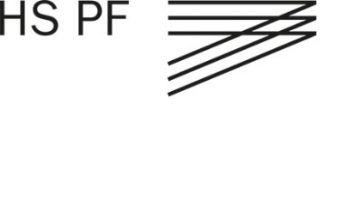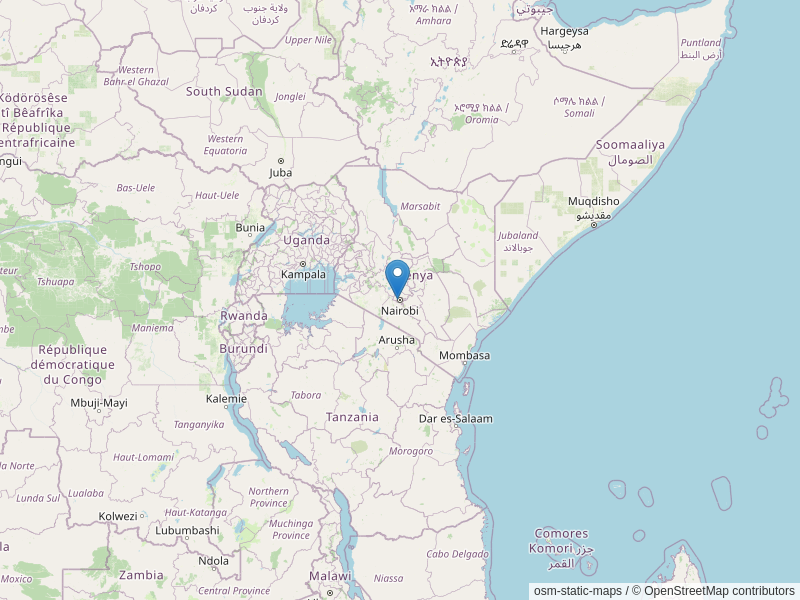Alumnus Dr. Ezekiel Mecha (University of Nairobi/University of Giessen) wants to promote education and awareness of endometriosis in East Africa
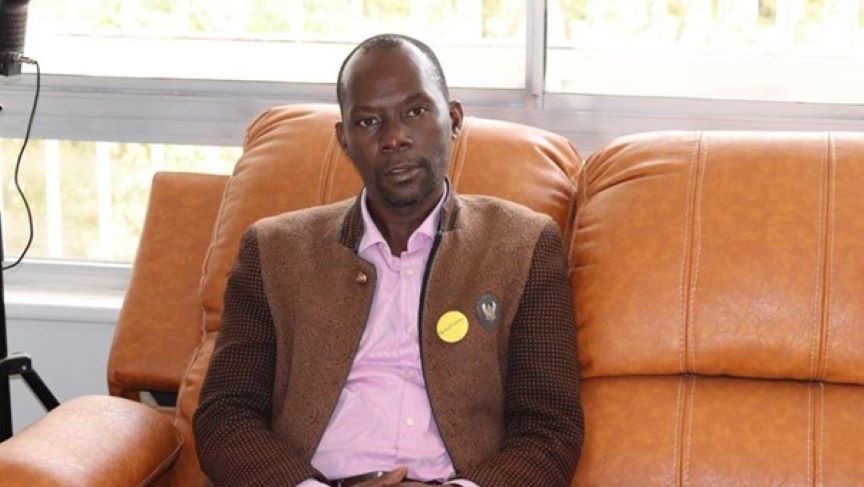
In this context, the DAAD sets itself the goal of networking alumni with each other and with the DAAD, whether by supporting the founding of alumni clubs or through various support programs and measures https://www.daad.or.ke/de/angebote-fuer-alumni/.
Today, in this Portrait of the Month, we would like to introduce to you Dr. Ezekiel Mecha, a DAAD alumnus of the University of Giessen, who earned his doctorate there and continues to use his networks and collaborations for his home university, the University of Nairobi, even after his sponsorship period. In particular, he has worked on the crucial topic of endometriosis. In 2021, Dr. Mecha organized a successful first virtual endometriosis awareness event in Kenya. In 2022, with DAAD funding, he hosted a follow-up face-to-face event in Nairobi, inviting key experts.
Who exactly is Dr. Mecha? Please read on to find out:
Please introduce yourself!
I am a lecturer at the Department of Biochemistry, Faculty of Science and Technology, University of Nairobi. I received my PhD in Reproductive Endocrinology from Justus Liebig University Giessen in Germany and have more than fifteen years of experience in research and teaching in the field of reproductive health, including endometriosis, adenomyosis, fibroids and other uterine problems.
I am a member of the World Endometriosis Society and participate in a World Endometriosis Society mentoring program. In November 2021, I was appointed as the Society’s only ambassador to the African continent.
I am spearheading a multi-sectoral and multi-professional approach to the management of endometriosis and adenomyosis by engaging all stakeholders in endometriosis care, with the aim of producing documentation on endometriosis policy in Kenya. In this regard, I have organized two international conferences on endometriosis supported by DAAD with the participation of local and international experts on endometriosis care. I am the Chair of the Kenya DAAD Scholars Association (KDSA), University of Nairobi Chapter, and a Board Member of the National Executive Council of the Kenya DAAD Scholars Association.
I am a DIES (Dialogue of Innovation for Higher Education Systems) alumnus and have participated in several training programs on managing internationalization in German universities in Hannover and Bonn. Together with Ms. Ann Kirugumi from Dedan Kimathi University of Technology (DEKUT), we conducted a series of workshops on internationalization management for Kenyan faculty and researchers in higher education in 2020. I have also participated in training on Collaborative Online International Learning (COIL) at Thomas More University of Applied Sciences in Antwerp, Belgium, and Amsterdam University of Applied Sciences in the Netherlands. Together with Dr. Huxley Makonde of Mombasa University of Technology, we hosted a successful DAAD-sponsored workshop on COIL in higher education systems in Kenya, inviting a number of local and international COIL specialists.
I have established a number of partnerships between the University of Nairobi and universities around the world. In the past year, I have established collaborations with Thomas More University of Applied Sciences in Antwerp, Belgium; Universidad CEU Cardenal Herrera in Valencia, Spain; Al-Quds University in Jerusalem, Palestine; and Universidad Peruana de Ciencias Aplicadas S.A.C. Santiago in Lima, Peru. The University of Giessen in Germany, the Frankfurt Fertility Center in Germany and the European Endometriosis League are also partners.
You are a DAAD alumni because you did your doctorate in Germany with a DAAD doctoral scholarship. Please tell us more about your time as a doctoral student in Giessen. Why Germany? What was your field of study? What was your experience like? What was your main research area?
In September 2010, I started my doctoral studies at the Justus Liebig University (JLU) in Giessen. Before enrolling at JLU, I completed a four-month intensive German course in Marburg. From September 2010 to June 2014, I completed my PhD in the Department of Obstetrics and Gynecology at Justus Liebig University under the supervision of my great mentors Prof. Dr. Dr. h.c. mult. Hans-Rudolf Tinneberg, Prof. Lutz Konrad, both from JLU, and Prof. Charles Omwandho from the Department of Biochemistry at the University of Nairobi.
Working at JLU allowed me to interact with the global student community at both the graduate and faculty levels. I also had the opportunity to interact with medical students doing projects in our laboratories. JLU has a DAAD-funded Giessen International Graduate Center for Biosciences (www.uni-giessen.de/fbz/zentren/ggl), which includes five departments dedicated to the biosciences. The GGL offers an interdisciplinary, clearly structured graduate program for all life science disciplines at Justus Liebig University, in human, dental and veterinary medicine, psychology and sports sciences, biology, chemistry, nutrition, agricultural and environmental sciences. Importantly, GGL graduates have a mail group/Whatsapp group and are in constant contact with each other; they are also frequently called back to Giessen after returning to their home countries to discuss their professional development.
As a DAAD-funded PhD student in reproductive endocrinology (biology) in Germany, I appreciated the availability of state-of-the-art research facilities and laboratories in the Department of Obstetrics and Gynecology and the other bioscience departments within GGL, which allowed me to conduct my research without restrictions. In addition, I benefited from the very good equipment and the open access to my supervisors. My main task was to perform experiments and generate data that I regularly shared with my mentors and lab colleagues.
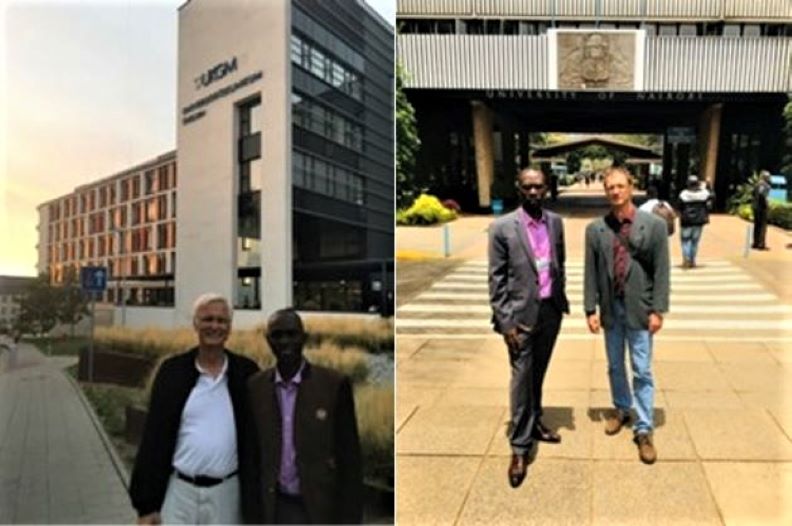
With Prof. Hans-Rudolf Tinneberg in Germany (left) and Prof. Lutz Konrad in Kenya (right)© Ezekiel Mecha
Prof. Hans-Rudolf Tinneberg and Lutz Konrad supported me financially to attend several major Reproductive Health International conferences in Germany and other European countries. At these conferences, I could present the results of my scientific research and meet other outstanding European scientists with whom I am still in contact today. In addition, the President of the University of Giessen, Prof. Dr. Joybrato Mukherjee, who is also the President of the German Academic Exchange Service (DAAD), met with all international JLU Ph.D. students every semester for dinner to discuss our progress. He stressed the importance of initiating long-term collaborations between JLU and our respective universities when we return to our home countries after completing our doctorates at JLU. Since Germany is the “Land of Ideas,” my interest in pursuing a Ph.D. in Germany was sparked when I worked on my master’s thesis in biochemistry at the KEMRI Center for Clinical Research in Kericho. Prof. Charles Omwandho, my master’s supervisor, visited me in Kericho to discuss my research project. During this time, we talked about the prospects of a DAAD doctoral scholarship to study in Germany and his pleasant working relationship with Professor Tinneberg, whom he had met at the University of Newcastle, Australia.
Prof. Charles Omwandho was a postdoctoral fellow in Prof. Tinneberg‘s laboratory in Giessen during my biochemistry master’s degree. I informed him that I wanted to do my Ph.D. in the same laboratory because it offered everything I needed for my Ph.D. studies. In addition, research was being done there on endometriosis, an area that interested me very much. Prof. Omwandho and Tinneberg consulted and instructed me to submit a proposal on endometriosis. I then went through the usual DAAD application process, and in 2010 I received the scholarship. My focus of study was reproductive endocrinology with an emphasis on endometriosis. My main goal was to find earlier diagnostic indicators for endometriosis. I used cell lines and blood and tissue samples from endometriosis patients. It takes between 6 and 11 years for endometriosis to be diagnosed, and as it progresses, the disease can cause great lasting damage to those affected, including infertility. Laparoscopy, which is expensive and invasive, is the primary method of diagnosis. Therefore, our laboratory at the University of Giessen is trying to identify non-invasive endometriosis diagnostic markers.
Currently, my two Ph.D. students in Giessen are conducting further research to identify more diagnostic markers. Apart from research, my life in Germany has been fantastic. From Monday to Friday, from 8 am to 6 pm, I dedicated myself to research. Depending on the type of experiment, I occasionally extended my working day until 9 or 10 pm and sometimes performed experiments until late at night. I devoted my weekends to socializing with friends and colleagues and traveling to other cities in Germany, especially the Hessian cities of Frankfurt, Marburg, Siegen, Dortmund, etc. As a Ph.D. student, I realized that social life is just as vital as academic life and that both must be balanced to produce an outstanding dissertation. To be successful in research and your job in Germany, you must be open, voice your viewpoint, ask questions if you don’t understand anything, and be honest with your supervisors, superiors, and co-workers.
You are now a faculty member at the university, how has your degree impacted your academic career?
I am responsible for undergraduate and graduate teaching at the Faculties of Science and Technology, Health Sciences, and Veterinary Medicine in my capacity as a lecturer.
With my Ph.D. in reproductive endocrinology and many years of research experience in reproductive biology in the areas of endometriosis, adenomyosis, fibroids, placental malaria, and endometrial cancer, I would like to teach and mentor students in reproductive health using what I have learned during my doctoral studies.
I have supervised several master’s and doctoral students in reproductive health and endometriosis at the University of Nairobi, local institutions in Kenya, and the University of Giessen, and I continue to do so. In addition to my doctorate studies, I have attended extra courses in Germany, including manuscript writing, grant writing, presentation skills, networking skills, and intercultural competencies.
These courses have allowed me to conduct seminars on these themes for students and faculty at the University of Nairobi and other Kenyan and East African institutions.
What is your current teaching and research area? What are you working on and researching, and what is your main area of interest? And do you still have contacts and collaborations with your alma mater?
My current teaching and research area is biochemistry (reproductive biochemistry/reproductive endocrinology). I teach Biochemical Endocrinology, Reproductive Biology, and other Biochemistry units to undergraduate and postgraduate students at the University of Nairobi. I also supervise BSc biochemistry students in their final year of study and Masters and Ph.D. students at the University of Nairobi and universities in Kenya, Justus Liebig University, and Thomas More University of Applied Sciences. Most of my master’s and Ph.D. students are researching endometriosis in Kenya and at Justus Liebig University in Germany. My students aim to develop cost-effective and non-invasive early diagnostic markers for endometriosis using metabolomics, transcriptomics, and proteomics techniques. Some of my students are researching fibroids, cancer, and adenomyosis to identify earlier diagnostic markers for more efficient and successful therapeutic interventions.
For a successful career, a researcher or scientist must have contacts and collaborations with his or her alma mater. I maintain contact with my alma mater at Justus Liebig University Giessen (JLU) and the International Giessen Graduate Center for Life Sciences (GGL), as well as with my GGL alumni colleagues working in Germany and other countries.
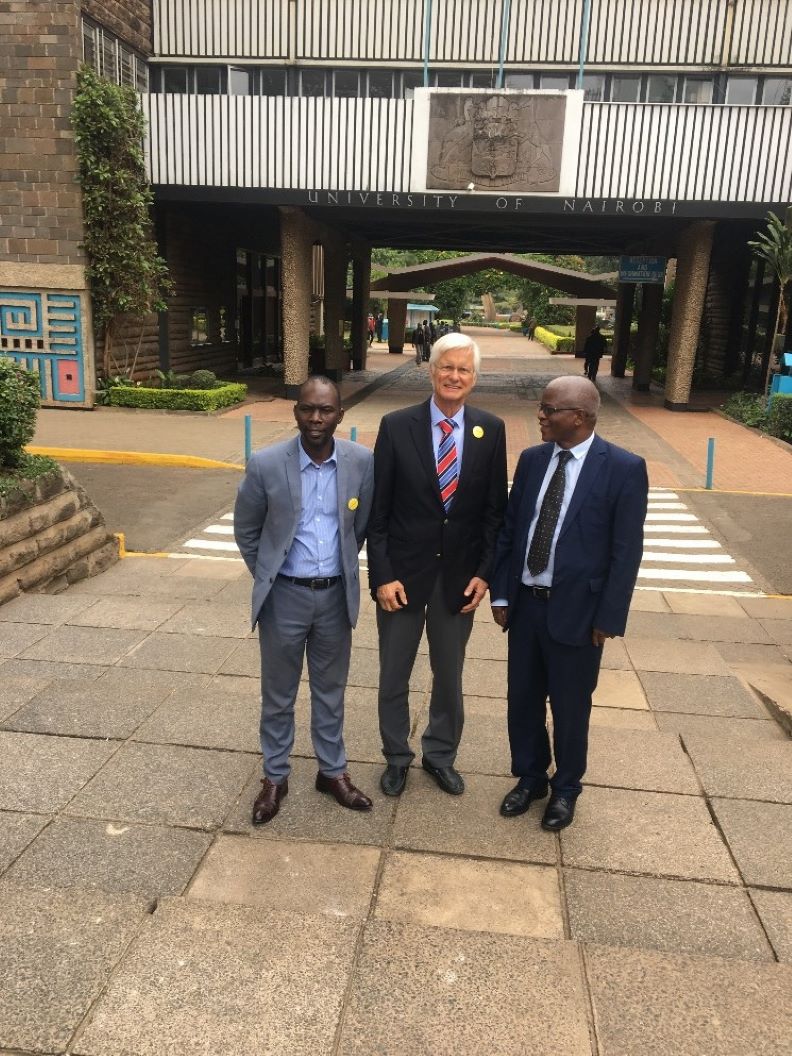
Dr. Mecha, Prof. Tinneberg and Prof. Omwandho at the University of Nairobi© Ezekiel Mecha
In addition, I am in contact with my Ph.D. supervisors at Justus Liebig University. I have invited them both to Kenya to give lectures at the University of Nairobi and to meet with colleagues at the University of Nairobi to discuss ways to deepen the UoN-JLU partnership. To continue the collaboration with my supervisors, I also placed two Ph.D. students on DAAD scholarships in the labs of Professors Tinneberg and Konrad in Giessen. One student will receive her Ph.D. in December after submitting her dissertation last month, while the other will complete her Ph.D. studies early next year. We have identified two other students who are currently working on their applications and waiting for the next DAAD call for applications.
In 2019, four years after completing my Ph.D., I received a three-month DAAD-funded re-invitation. I had the opportunity to work in the lab and see my supervisors and Ph.D. students again in Giessen. I also had the opportunity to talk to GGL Ph.D. students, meet GGL staff, and have a long conversation about the collaboration between GGL and UoN.
In 2019, I welcomed my Ph.D. supervisor, Prof. Lutz Konrad, to Kenya for a month, where he gave a lecture at the UoN Department of Biochemistry. He also gave a lecture at the Aga Khan University Hospital. He attended the Kirinyaga University International Conference, where he was the keynote speaker, and was invited by my Ph.D. advisor, the current DVC Prof. Charles Omwandho, who started the relationship between Giessen and Nairobi. In addition, we invited Prof. Lutz Konrad to offer virtual lectures and presentations at the University of Nairobi and Kirinyaga University, strengthening our existing partnerships: east-african-endometriosis-conference.org/speakers/speakers.html.
Prof. Dr. Joybrato Mukherjee, President of the University of Giessen and current DAAD President, visited Kenyatta University in 2020 and gave a presentation entitled “What’s next? The Future of African-German Cooperation in Higher Education” during his Kenya trip. We briefly discussed Giessen and how we can further strengthen the partnership between the University of Nairobi and JLU.
In June 2022, I invited my supervisor, Prof. Hans-Rudolf Tinneberg, to Kenya to deliver the keynote address at the 2nd East Africa Endometriosis Conference, which took place from June 22nd to 24th. He also attended a pre-conference workshop at Tumutumu Hospital Karatina. He performed laparoscopic procedures on endometriosis patients alongside Dr. Joseph Njagi (my Ph.D. student at the University of Nairobi) and Dr. Yamal Patel of Laparoscopy Mashinani. Prof. Tinneberg also presented at the Department of Biochemistry, Faculty of Science and Technology, University of Nairobi, and Kirinyaga University, organized by Prof. Charles Omwandho. While at Kirinyaga University, Professor Tinneberg also met with the Kirinyaga University council, with whom he discussed the modalities for initiating a collaboration between Kirinyaga University and JLU.
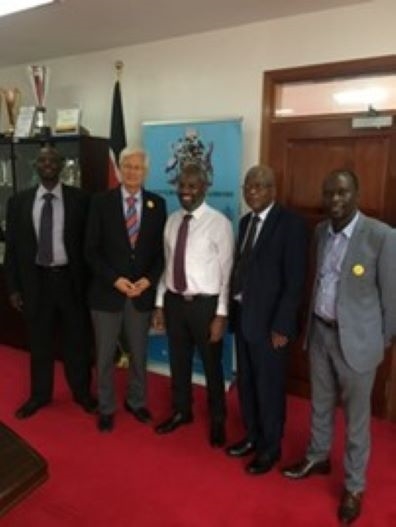
Prof. Tinneberg, Prof. Kiama, Prof. Omwandho and Dr. Mecha© Ezekiel Mecha
Prof. Hans-Tinneberg met with the Vice Chancellor of the University of Nairobi, Prof. Stephen Kiama, Prof. Charles Omwandho, and I to discuss ways to strengthen the relationship between the University of Nairobi and the University of Giessen.
As a result, Aga Khan University hospital, Kirinyaga University, Kenya Obstetrics and Gynecological Society (KOGS), Kenya Society of Endoscopic Surgeons, Laparoscopy Mashinani, 3rd Park Hospital, and other local endometriosis groups are joining our initial UoN-JLU cooperation. Dr. Joseph Njagi, a gynecologist and endoscopic surgeon, has already been invited to Italy and Germany to study minimally invasive surgical techniques in the laboratories of Prof. Caterina Exacoustos and Dr. Alin Constantin in the Departments of Obstetrics and Gynecology at the Universities of Rome and Hamburg, respectively. Both trips will occur in October 2022.
Lastly, we are in contact with my alma mater and my supervisors through the joint publication of more than ten research articles in internationally renowned journals and three articles in Kenyan newspapers. We have also given endometriosis talks with Prof. Hans Rudolf Tinneberg on two Kenyan television stations https://www.youtube.com/watch?v=iCl2LmKqNQ.
Please tell us more about the two alumni conferences in 2021 and 2022 that you organized.
As mentioned earlier, my Ph.D. advisors funded my attendance at several European international conferences. In these conferences, I established that effective endometriosis management requires all stakeholders, including clinicians (obstetricians and gynecologists), researchers, journalists, patients, politicians, councilors, psychologists, and postgraduate students researching endometriosis and other associated disorders.
In 2014, on returning home after completing my Ph.D. studies, I desired to establish an endometriosis research group. I approached some clinicians and discovered that it was difficult to convince clinicians to work on endometriosis. I attempted to contact endometriosis patients but quickly understood that they were unwilling to come forward and did not wish to disclose their condition owing to its stigma. My three Ph.D. advisors, Professor Hans- Rudolf Tinneberg, Professor Lutz Konrad, and Professor Charles Omwandho, and I agreed that we must raise awareness of this problem. We decided that we needed to translate our laboratory findings into information suitable for publication in Kenyan newspapers.
In January 2020, we published an article in the star newspaper titled “Extreme pain can be a sign of endometriosis; Experts warn (https://www.the-star.co.ke/health/2020-01-08-extreme-period-pain-could-be-a-sign-of-endometriosis-experts/). In June 2020, we published another story on the star newspaper titled “Scientists Discover Essential Molecules That May Help Fight Endometriosis” As a result of these two publications, we received encouraging feedback from readers, and several patients and clinicians contacted us, which led to the conception of the East African Endometriosis Conference.
First Conference on Endometriosis in East Africa
The 1st East African Endometriosis Conference was held virtually between the 19th and 21st of May 2021 at the University of Nairobi and is available at this link: https://east-african-endometriosisconference.org/. All conference proceedings are archived at (https://endometriosis.org/topic/news/congress-highlights/). The conference was included in the list of global endometriosis events.
The conference’s main theme was “Campaigning for better awareness, management and research of endometriosis in East Africa .” The conference attracted a total of 98 attendees, including DAAD alumni, local speakers who were not DAAD alumni but were experts in the field of endometriosis, international speakers in the area of endometriosis, non-DAAD alumni participants who have endometriosis, and those affected by the condition, and international participants involved in the field of endometriosis. In addition, representatives from the University of Nairobi administration and the DAAD office in Nairobi were present at the session. The conference gathered attendees and presenters from eight nations, including Kenya, Uganda, Nigeria, Germany, Italy, the United Kingdom, Turkey, and India. The speakers included physicians, researchers, journalists, community social workers, graduate students researching endometriosis, patients, and caregivers who were specialists in their respective fields.
During the conference, forty abstracts were presented in plenary and parallel sessions. This conference’s proceedings are accessible online at https://east-african-endometriosis-conference.org/index0. The conference produced fourteen resolutions, including ideas for future annual conferences.
Second Conference on Endometriosis in East Africa
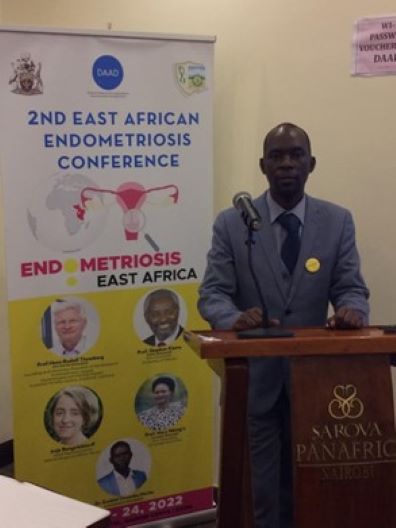
At the 2nd East Africa Endometriosis Conference© Ezekiel Mecha
The 2nd East Africa Endometriosis Conference was held at the Sarova Panafric Hotel in Nairobi, Kenya from 22nd to 24th June 2022 in a hybrid format with some people participating virtually. On the conference website (https://east-african-endometriosis-conference.org/), you may access the proceedings of this conference. In addition, the conference was included in the worldwide endometriosis events calendar, and the proceedings are archived at https://endometriosis.org/topic/news/congress-highlights/.
The conference’s primary theme was “Endometriosis in extreme ages and uncommon settings; debunking myths and removing associated stigma in Africa,” with five subthemes.
The conference drew a total of 176 participants, including DAAD alumni, local speakers who were not DAAD alumni but were experts in the field of endometriosis (researchers, clinicians, and councilors), international speakers in the field of endometriosis, non-DAAD alumni participants who have endometriosis and those affected by the condition, and international participants involved in the field of endometriosis. In addition, representatives from the University of Nairobi, Kirinyaga University, and the DAAD office in Nairobi were present at the conference. Twelve countries were represented: Kenya, Uganda, South Africa, Nigeria, Germany, Italy, the United Kingdom, Turkey, Russia, Ukraine, the United States, and India. Physicians, researchers, journalists, community social workers, graduate students, patients, and their caregivers were among the presenters who were professionals in their respective fields. Eleven resolutions were passed, including establishing endometriosis centers of excellence throughout the nation.
You are the Director for Endometriosis East Africa and were recently appointed as an Ambassador by the World Endometriosis Society. Please tell us more about this.
Endometriosis East Africa
According to the organization’s website (https://east-african-endometriosis-conference.org/), Endometriosis East Africa (EEA) was established two years ago (2020) to aid in educating and raising awareness about endometriosis in the East African region. Due to the enormous financial, social, and psychological effects of endometriosis and the lack of endometriosis awareness campaigns in Kenya, East Africa, and the rest of the African continent, it was necessary to approach endometriosis management from a multi-sectoral and multi-disciplinary perspective involving all stakeholders. Also, after realizing that in Kenya, endometriosis management stakeholders such as clinicians, researchers, patients, caregivers, activists, health journalists, advocates, councilors, etc. do not collaborate for better endometriosis management, we came up with the idea of forming a non-profit to advocate for effective endometriosis management strategies. EEA’s main objective is to champion campaigning, management and research of endometriosis in East Africa. Focus areas of EEA include expanding endometriosis awareness campaigns in East Africa and informing the public through print media and other venues on the progress made in understanding the pathophysiology of endometriosis. Sharing with the public the various diagnostic approaches for endometriosis, such as superficial peritoneal endometriosis and deep infiltrating endometriosis, as well as modern imaging techniques and clinical research. It also includes educating the public on the numerous endometriosis treatment options based on the patient’s age, symptoms, and type, and the possibility of endometriosis coexistence with other uterine problems (e.g adenomyosis and uterine fibroids).
EEA’s membership is comprised of clinicians, researchers, endometriosis patients, legislators, councilors, sociologists, and psychologists from East Africa. Our ultimate objective is to reach out to other African endometriosis organizations in order to build a continental African Endometriosis group. In addition, EEA intends to welcome members of worldwide endometriosis organizations, such as the European Endometriosis League, Asian Endometriosis Society, Endometriosis Australia, and the Nigeria-based Endometriosis Africa support group. EEA also intends to collaborate with regional endometriosis centers of expertise.
EEA helps endometriosis patients by conducting workshops, seminars, conferences, and medical camps. Additionally, the group promotes and initiates relationships between local gynecological/endoscopic/endometriosis organizations and European endometriosis associations. These collaborations will result in an exchange or post-doc program on gynecological surgery with an emphasis on minimally invasive surgery and oncological procedures for Kenyan gynecologists to visit advanced endometriosis centers in Europe, as well as the invitation of German gynecological/endometriosis/research experts to the country to train local doctors and researchers. In addition, EEA is at the forefront of participation in global endometriosis events, including in world endometriosis conferences and other global conferences.
Appointment as World Endometriosis Society Ambassador
As the director of Endometriosis East Africa, I contacted Professors Andrew Horne and Philippa Saunders of the University of Edinburgh, Scotland (UK) in 2020, as well as Professor Hans-Rudolf Tinneberg of Frankfurt Fertility Center (Germany), for guidance on how to expand endometriosis awareness and research in Africa. Prof. Andrew Horne and Philippa Saunders, the presidents of the World Endometriosis Congress that will be held in Scotland in 2023 (http://endometriosis.ca/world-congress/wce2023/), advised me to write a commentary article on ” endometriosis care in Africa” and to organize an endometriosis conference. Prof. Hans- Rudolf Tinneberg also advised me on the matter and suggested several prominent European endometriosis experts whom I could call as international speakers for the conference.
The 1st East Africa Endometriosis Conference was recognized among the global endometriosis events, and it was the only conference of its kind to originate in Africa. Prof. Luk Rombauts, Medical Director of Monash IVF group president and president of the World Endometriosis Society (https://endometriosis.ca), also took notice of its success. He informed me in November 2022 that I had been nominated as a World Endometriosis Society Ambassador for a three-year term and as the only ambassador from the African continent. I accepted the nomination and was sent a letter of appointment for a three-year term. I was also listed as an ambassador on the World Endometriosis Society: http://endometriosis.ca/about/ambassadors. Being an endometriosis ambassador is a tremendous responsibility, but the chance has allowed me to network with fellow ambassadors worldwide. In addition, this honor has led to my appointment as an associate editor for a number of endometriosis/reproductive health journals. Lastly, the position of ambassador has enabled me to raise awareness of endometriosis through local and international media outlets.
What more needs to be done to inform and educate people about endometriosis in East Africa? How?
Increased endometriosis awareness initiatives are required in Kenya and the East Africa region. This can be accomplished by including endometriosis-related themes into upper primary and secondary school curricula and by increasing the training of gynecologists and other physicians on the latest endometriosis diagnostic and surgical techniques. Also, there should be Increased awareness of endometriosis in both social media and traditional media such as print and television. Only a multi-sectoral and multi-disciplinary approach including all stakeholders, including but not limited to clinicians, researchers, patients, caregivers, activists, health journalists, advocates, councilors, and employers, can accomplish this.
Providing the public with accurate information regarding the stigma associated with endometriosis could raise awareness. Educating the public regarding the etiology of endometriosis, the many diagnostic techniques to endometriosis, and the available treatment choices for endometriosis would also be necessary. In addition, since the prevalence of endometriosis in Kenya and East Africa is unknown, research must be conducted to determine the prevalence, which will then be given to the East African governments with the goal of implementing endometriosis policies in the individual nations. The endometriosis policy enables governments to commit budgetary funds for endometriosis management. Lastly, it is necessary to seek additional funding from other organizations to increase the number of webinars, seminars, workshops, conferences, and medical camps for patients who cannot afford the costly laparoscopic treatments. All of these will result in superior therapeutic intervention and endometriosis management.
Do you have any other advice or recommendation for DAAD alumni work?
My recommendation to my fellow DAAD alumni/alumni who obtained a DAAD scholarship to pursue their studies or brief training is that we should give back to the community by sharing our acquired knowledge and abilities.
We can accomplish this through staging workshops, seminars, and conferences, as well as disseminating information about the DAAD and other opportunities in Germany. In addition, I propose that the graduates maintain contact with their alma mater and formalize cooperation between their institutions and the universities/institutions in Germany where they studied.
These connections can be maintained by collaborative authoring of research proposals, joint publication, joint supervision of students, and joint planning of events such as workshops and conferences. I also encourage my fellow alumni to extend their local and global networks.
Additionally, I encourage my fellow DAAD alumni/alumni to use the many opportunities provided by the DAAD or other funding organizations to help us advance in our careers and assist and mentor others in achieving career success. In addition, I encourage my fellow DAAD graduates/alumni to apply for the DAAD-sponsored alumni event funds to create meaningful 21st-century seminars, conferences, and other events.
For alumni events to have a bigger impact on society, we must devise topics that are both original and pertinent.
Lastly, I would like to thank the DAAD for providing me with funds to organize a number of alumni events and also for supporting my Ph.D. and Post-Doc research in Germany. ONCE A DAAD ALUMNUS, ALWAYS A DAAD!
Thank you very much for the interview, Dr. Mecha. We enjoyed writing your story. We wish you all the best in your endometriosis research, your new appointment, and all your plans!



